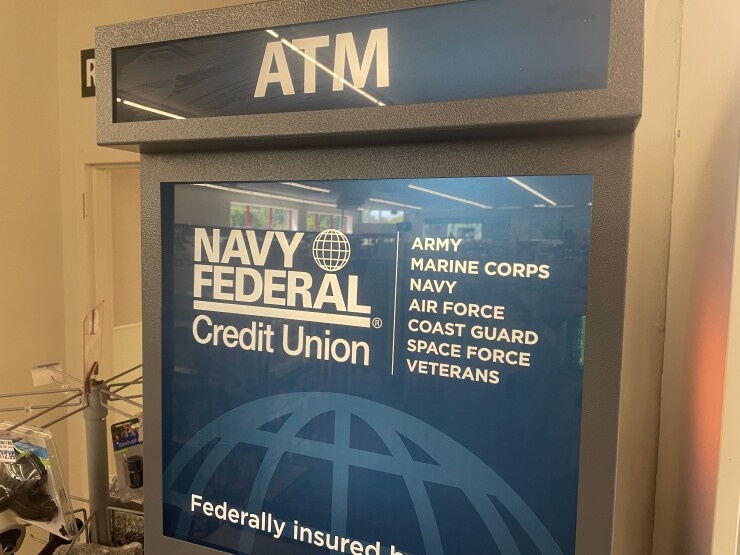
The Department of Defense established the overseas banking program after World War II to provide active-duty military members with retail, financial and cash services. The Vienna, Virginia-based
The agreement was already under fire from the banking industry, and now the National Credit Union Administration says federal law prevents it from insuring any accounts offered through the program.
Under the terms of this program, the service members become customers of "Community Bank, operated by Navy Federal Credit Union," and not members of Navy Federal itself — a distinction that would make it neither "permissible [n]or proper" under the Federal Credit Union Act to insure those accounts through the National Credit Union Share Insurance Fund, an NCUA spokesman said.
"Deposits made by customers of the Community Bank as part of the Overseas Military Banking Program are separate and apart from those deposited by members of Navy Federal Credit Union," said the spokesman, Joe Adamoli. "Navy Federal would only be acting as a servicer for the DoD program, and the deposits from that program would not be those of Navy Federal's members."
Navy Federal isn't satisfied with this explanation. In an email to American Banker, Mary McDuffie, president and CEO of the $165 billion-asset credit union, said that under the law, the NCUA can insure any credit union activity it determines to be proper.
"But somehow, it has not found it 'proper' to provide insurance to a DoD program that supports deployed overseas service members and their commands," she wrote. "It is rare that we see resistance to our mission-driven efforts that we are experiencing from the NCUA. Without a committed insurance partner in this OMBP endeavor, the NCUA is going to leave service members and their families overseas without the financial support that they deserve."
Under the contract, Navy Federal would operate 60 banking facilities and 275 ATMs throughout Europe and the Pacific.
Anthony Hernandez, president and CEO of the Defense Credit Union Council, which advocates for the interests of America's credit unions serving the military and veteran communities, said the Department of Defense was asked to brief the Senate Committee on Armed Services about the issue earlier this month.
"From what I understand, DoD acknowledged the problem and discussed a few alternatives," Hernandez said. "[The council] is always concerned when DoD or anyone else speaks to Congress about any aspect of its banking program. This issue directly impacts each of our member credit unions who serve on military installations without the benefit of a government contract."
Even if the issue of deposit insurance is resolved, the deal faces other hurdles, as representatives from the banking industry have highlighted.
The Association of Military Banks of America has several issues with the contract being awarded to Navy Federal, including that the Department of Defense will no longer be able to credibly enforce its "one bank-one credit union" policy in the United States, said Steven Lepper, the association's president and CEO.
That policy has been in force for a couple of decades and precludes banks from competing with other banks, and credit unions from competing with other credit unions, on military installations. When Bank of America held the contract, a credit union could open a branch on the same base without tipping the balance; with Navy Federal taking over for BofA, it would add a second credit union to the bases that already have one.
The policy is meant to give military personnel, families and military organizations a choice of types of financial institutions, products and services without overpopulating bases with banks and credit unions, Lepper said.
Credit unions are exempt from the lease costs that banks would pay to operate on these bases, Lepper said. This made it easier for credit unions to come in and compete with Bank of America, but any banks that choose to compete with Navy Federal would not have the same advantage, he said.
"The departure of banks from military bases, driven by a disparity in lease costs, will accelerate if multiple credit unions can fill the resulting void," Lepper said.
Lepper said the contract "debacle" has illuminated the dysfunction inherent in the Department of Defense banking program.
Both the American Bankers Association and the Independent Community Bankers of America declined to comment on Navy Federal's involvement in the overseas banking issue. But in a
"With large credit unions now apparently insecure enough about their industry to want to pretend they're community banks, Congress should use this opportunity to investigate the nation's outdated credit union policies — and whether the government should continue subsidizing acquisitions of real, local, taxpaying community banks," she wrote.
Lepper said he is concerned that more banks will leave military installations if credit unions feel emboldened by BofA's departure. He said the credit union lobby has already prevented AMBA from securing legislative relief allowing banks to operate free of lease charges on military bases — a benefit credit unions already enjoy.
"We fear that the credit union lobby will shift into overdrive to ensure rising lease costs close the few remaining banks on bases so that credit unions can take their place," he said.






